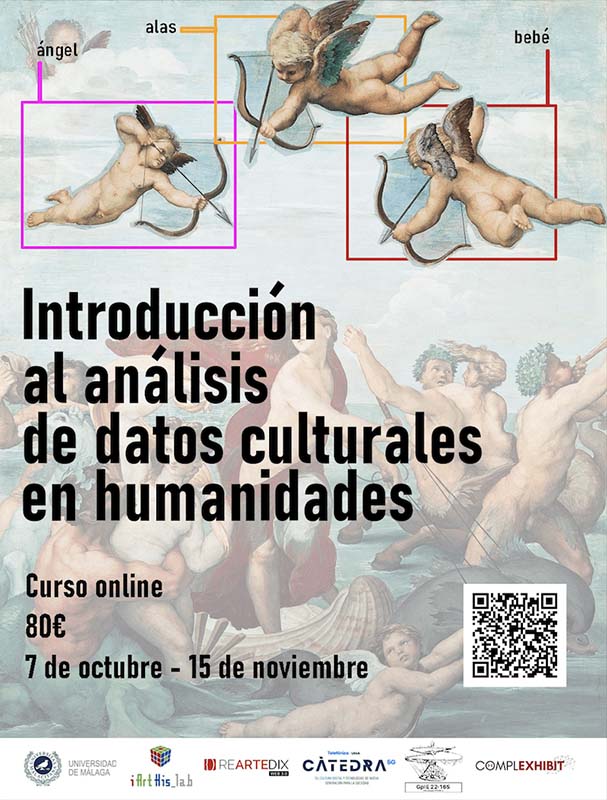University Extension Certificate. University of Malaga
DATA
- TitleI University Extension Certificate "Introduction to the analysis of cultural data in the Humanities" (UMA's own degree)
- Modality: online
- Credits: 3 ECTS
- Development: 7 October to 15 November 2024
- AddressNuria Rodríguez Ortega (UMA)
- Subdirectorate: Bárbara Romero Ferrón (Utrecht University)
- FacultyBárbara Romero Ferrón (University of Utrecht), María Ortiz Tello (UMA)
- This course is part of the activities of the International Network on Digital Developments in Artistic Culture (ReArte.Dix) and the Telefónica-UMA Chair (5G, Digital Culture and New Generation Technologies for Society.
DESCRIPTION
One of the main challenges we face is the common tendency to think that humanities research does not work with data. Therefore, everything related to data analysis and the field of computation not only seems alien, but is often perceived as irrelevant and useless to our work as humanists.
As digital humanists, our purpose is not to perpetuate the divide between the computational, mathematical or data-driven, and the humanities, but to seek synergy, intersection and collaboration in order to enhance our research and prepare us professionally for a post-digital world.
In this course, we will tackle this issue from start to finish: the collection and creation of data, its analysis, visualisation and subsequent publication. Reading it this way, it may sound more complicated and intensive than it really is, but don't worry. No previous experience in data handling or programming is required, and we will only use free software. In addition, we will be assisted by artificial intelligence, which will serve as an ideal ally to enhance our skills.
The intention of this course is to give you an introductory understanding of each stage of working with data, while critically reflecting on important issues such as bias, the fallacy of objectivity and how a humanist can apply their knowledge in professional fields that require computational and digital tools.
This course is designed for researchers who wish to start applying computational methodologies in their work, as well as for humanists (students, graduates or practitioners) interested in exploring the convergence with digital, computational and datification. Throughout the course, each participant will have the opportunity to work with small, pre-selected datasets (if you have your own data, bring it!), so that at the end they will be able to publish their work and add it to their portfolio.
Programme:
1. Knowledge production
1.1 Introduction to research questions. Fundamental concepts and
formulation
1.2 Data collection and fabrication. Quantitative and qualitative techniques
1.3 Data organisation and structuring. Introduction to data models.
data
1.4 Critical look at working with data. Identification and questioning of
bias
Data processing and analysis
2.1 Data preparation. Cleaning, standardisation and controlled vocabularies.
2.2 Exploratory data analysis
2.3 Statistical analysis. Introduction and methods
2.4 Generative AI, your new assistant. Formulating effective Prompts
2.5 How to visualise and communicate your results
2.6 Open science and how to contribute to the community while being paid back
This course uses the methodology of inverted class (Flipped Classroom). Each week, there will be added theoretical content that students will be required to read and review in their own time, along with small reflection and follow-up assignments. Every Thursday, from 10:00 to 11:30 a.m.In addition, there will be an online class in which these tasks will be worked on together and discussions will take place. This class will be optional and participants may choose to upload their weekly assignments to the Virtual Campus. In addition, during the week, there will be flexible tutoring hoursThe students and teachers will be able to meet to resolve doubts about the final project or the different topics of the course.




